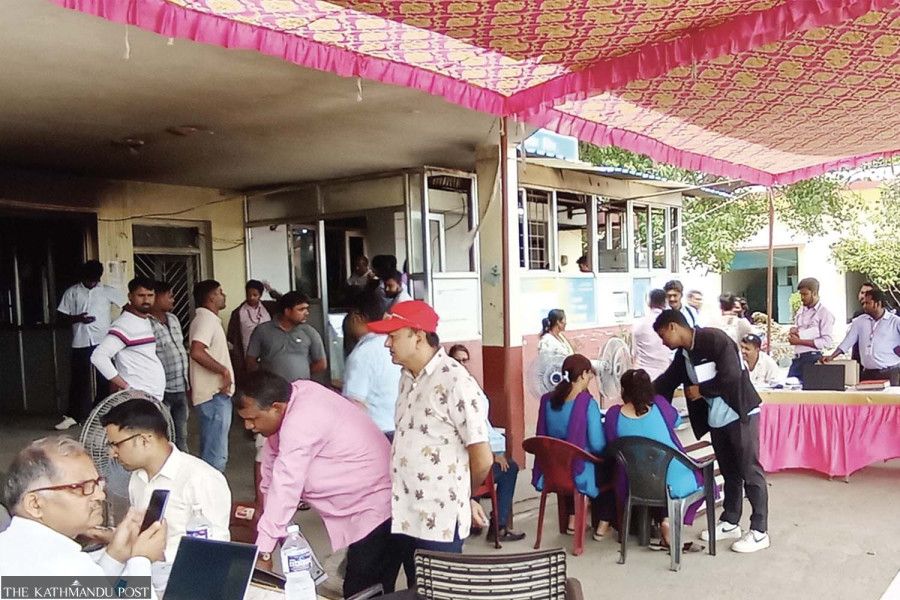National
Essential services resume in districts under makeshift arrangements
Some offices are operating from tents with borrowed laptops and furniture. Officials say normalcy will return soon.
Post National Bureau
In the aftermath of the September 9 Gen Z protests that saw hundreds of government buildings across the nation torched and vandalised, local administrations are struggling to deliver even the most essential services. From customs to district administration offices, officials are now working under makeshift tents with borrowed laptops and temporary power lines.
“We have pulled wires from nearby private homes just to run a few computers,” said Kiran Joshi, assistant chief district officer in Kailali, where three administration buildings were gutted by fire. “After cleaning the debris today (Sunday), we managed to distribute a handful of citizenship certificates. It is far from normal, but we are trying," said Joshi.
The protests, led by the Gen Z youth movement against corruption, had started peacefully on September 8, but escalated into deadly chaos when police gunned down 19 youth protesters outside the federal parliament building later in the day. The violence on September 9 swept across the nation leaving hundreds of public offices and businesses across the nation in ruins.
By nightfall, district administration offices, municipal buildings, courts, and even political party offices in Kailali, Rupandehi, Kanchanpur, and Chitwan districts were under attack. According to police, 79 government offices and at least 17 private homes and businesses were torched in Chitwan district alone.
In Rupandehi, the damage has paralysed the country’s second-busiest customs point at Belahiya in Bhairahawa, on the Indian border. Protesters burned the customs office—two floors of the main building, security guard post, and canteen—the Rastriya Banijya Bank branch, and the passenger service centre. Furniture, computers, and crucial documents all went up in flames.
“We resumed partial operations at the customs from Thursday,” said Shiva Lal Neupane, chief of the office. “Essentials such as cooking gas, vegetables, and fruits are now being processed under tents in the yard using borrowed laptops. From Sunday, even Indian tourist vehicles have started entering.”
But the local server was destroyed, delaying clearance for trucks travelling onwards to other Nepali cities—a long line of cargo trucks stretching from Sunauli to Nautanwa on the Indian side. “We have opened the border to prevent shortages,” Neupane insisted. “It is not comfortable, but essential goods are being transported.”
The Internal Revenue Office next door suffered even worse damage. “The entire building is unusable,” said office chief Premraj Pokharel. “All computers, files, furniture, even a vehicle and staff bicycles were destroyed.”
After damage assessment teams finished documentation, staff began work on Sunday with just three laptops and a single printer under a tent. “Most payments happen online,” Pokharel said. “For now, this is how we will serve taxpayers.”
Tokaraj Pandey, chief district officer of Rupandehi, said the loss to public property was massive, but added that full figures will only be available after assessments conclude on Monday.
“Offices not affected are operating normally,” he said. “For burned offices, we are pitching tents and using whatever furniture we can find. Even when we cannot provide services immediately, we record every citizen’s visit so no one is forgotten once systems are restored.”
Rupandehi district court resumed only urgent services, like arrest warrants, remand extensions.
Kanchanpur has a similar ordeal. Electricity wires charred by fire were replaced Sunday as officials raced to restore passport and national ID services. “Citizenship services depend on whether we can make another computer system work,” said Chief District Officer Laxman Dhakal.
Shuklaphanta Municipality reported severe destruction of its main office and most ward offices. “Damage assessment and debris clearance will take a week before services can resume,” read a municipal notice. Krishnapur Municipality Mayor Hemraj Ojha said they too could restart services only after repairs.
Police confirmed that over 30 government offices, 17 political leaders’ houses, and four commercial buildings were attacked in Kanchanpur. Both Nepali Congress and CPN-UML party offices were torched.
In Chitwan, markets, schools, and transport reopened Sunday after the curfew was lifted, but government offices remained largely deserted. Chief District Officer Ganesh Aryal said ward chairs were being urged to at least resume social security payments and recommendation letters.
“We are ready to issue citizenship if ward offices provide recommendations,” Aryal said. “But many ward offices themselves were burned.”
A seven-member team is now collecting damage details across Chitwan. Some charities have offered computers and furniture, which Aryal said would be distributed under a one-door policy coordinated by the administration.
Across all affected districts, officials stressed that the disruptions are temporary. “We have instructed our staff to follow up with every citizen once systems are restored,” Rupandehi CDO Pandey said. “Operations will return to normal, but rebuilding will take time.”
(Ranjana BC in Kailali, Dipendra Baduwal in Chitwan, Bhawani Bhatta in Kanchanpur and Ramesh Kumar Paudel in Chitwan contributed reporting)




 18.12°C Kathmandu
18.12°C Kathmandu














